By Shantanu Kaushik
Data is the most critical entity after operations for any enterprise. Organizations are keen on maintaining accessibility and uninterrupted data sharing for their deployed practices. One single gap in service could result in huge losses to the business’ image. A simple to operate and easily scalable storage option is always the answer to most data sharing practices. The answer is Alibaba Cloud File Storage NAS.
In the previous article of this series, we discussed the prominent features, benefits, and integration scenarios of Apsara File Storage NAS with other Alibaba Cloud products and services. This integration ensures a more sophisticated service scenario that has lower chances of failure and reflects superior data durability and business continuity.
In this article, we will discuss service comparisons between Alibaba Cloud File Storage NAS and Object Storage Service (OSS), and between Elastic Block Storage (EBS) and File Storage NAS. We will also showcase the use-case scenarios of Alibaba Cloud File Storage NAS and how it works with different deployment and access models, including DevOps and containers.
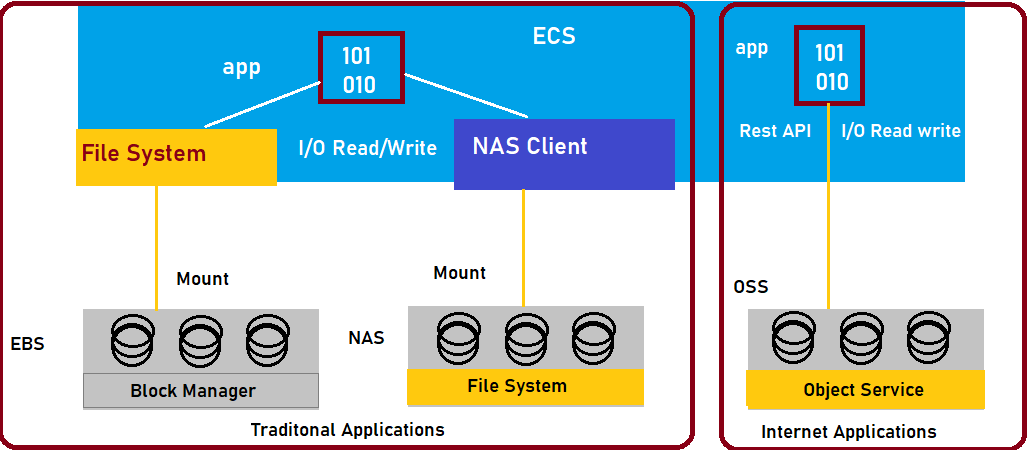
Let’s take a look at the major differences between Alibaba Cloud File Storage NAS and Object Storage Service (OSS).
| Alibaba Cloud NAS | Object Storage Service (OSS) |
| Provides High-Throughput | Meant to traverse or distribute large volumes of data through the internet |
| Provides High-IOPS | Meant to traverse or distribute large volumes of data through the internet |
| Random Read and Write Operation | Does not support random read and write operations |
| Online Modification of File | Upload and download operation with multi-access support |
| Mimics Local File System | Upload and download operation with multi-access support |
| Tree Hierarchy of Storage | Restful APIs to access |
| Support SMB Protocols | Doesn’t support SMB protocols |
| Thousands of ECS instances perform concurrent random read/write operations on the Alibaba Cloud File Storage NAS file system through POSIX. | Millions of users can access and perform concurrent append operations using the Alibaba Cloud OSS bucket on the web. |
| Low Latency ~milliseconds | Ultra-Low Latency ~10s of Milliseconds |
Let’s take a look at the differences between Alibaba Cloud NAS and Alibaba Cloud Block Storage.
| Alibaba Cloud NAS | Alibaba Cloud Block Storage |
| High-Throughput | Lower throughput than NAS |
| Access to thousands of concurrent ECS instances | Each instance works for a particular ECS instance |
| Relatively Low Latency (milliseconds) | Ultra-Low Latency (microseconds) |
| Unlimited and auto-scalable storage | 32 TB and unscalable storage |
| Much bigger and multi-trade deployment supported | Used with NoSQL or Online Transactional Processing (OLTP) |
| Managed Service | Cluster Management is highly necessary |
| Distributed application architecture | I/O intensive applications |
| POSIX support | Bare Disk – User formattable |
After showcasing the differences between these storage services from Alibaba Cloud, we hope making a decision will be simpler.
Let’s start by modeling this use-case scenario into an architecture to understand the flow of information:
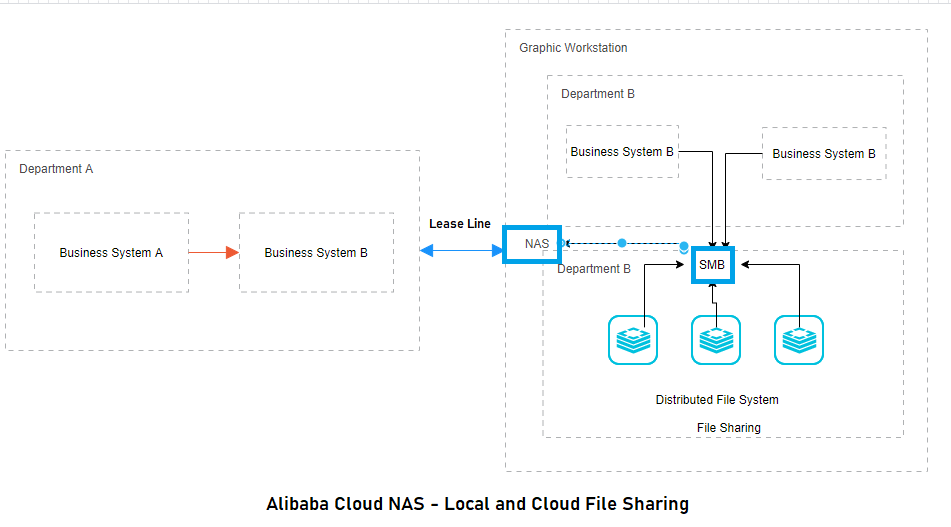
Alibaba Cloud NAS is a highly scalable, highly available, elastic, and persistent storage solution. It can be used to store enterprise application data and files along with the applications that are delivered as services. NAS provides standard file system interfaces that mimic the user experience of the local file system. This enables easy development and deployment of applications or any migration scenarios for your applications to Alibaba Cloud.
In this scenario, Business A is deployed in the organization’s on-premise data center. Business B is deployed on the cloud. Information from system A has to be uploaded to the cloud and used by system B as application data.
A solution is presented using Alibaba Cloud File Storage NAS (NAS Standard version), which provides elastic storage. The organization can enable file sharing between the on-premise and cloud-based storage using Alibaba Cloud NAS. This proves to be a cost-cutting scenario, as the cloud storage node can act as the primary storage source, which is already an elastically scalable resource.
Let’s go through the scenario-based architecture implemented with Alibaba Cloud File Storage NAS:
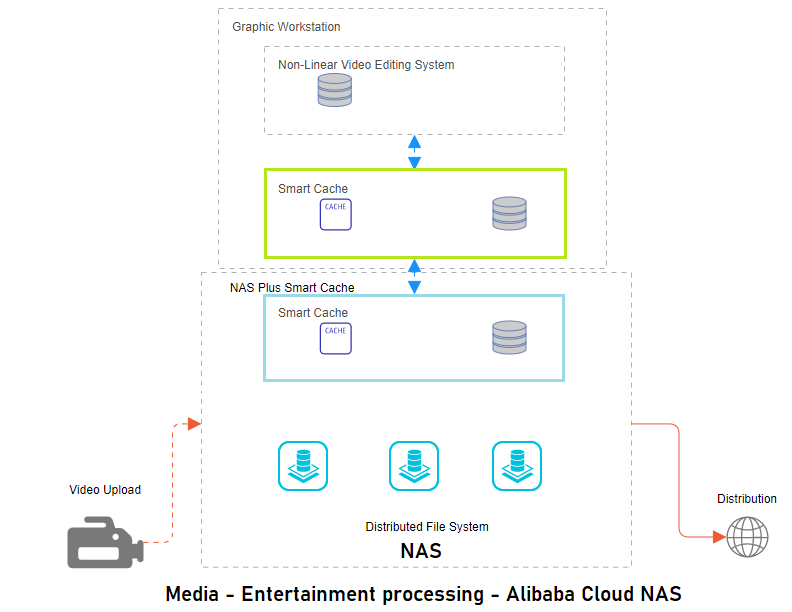
Alibaba Cloud provides high-performance shared storage to deal with production, video editing, audio processing, rendering, audio broadcasts, and processing other large files in the media and entertainment industry.
Alibaba Cloud File Storage NAS reduces the overall time taken for these tasks with its powerful data consistency model. High throughput, shared file access, and merging multiple local file repositories into a single repository helps overcome any clogs in the productivity chain. Unified access is provided to all users to implement a hierarchy.
Performance NAS enables the user to leverage the performance write of hundreds of web servers at a time. These web servers can simultaneously write to business logs that are stored in the shared file system without worrying about the capacity limits. Dynamic analysis of this data is performed by mounting the file system on multiple data analysis clusters. After a successful analysis, the report is made available to the user/administrator within ten minutes.
Let’s take a look at the architecture associated with this scenario:
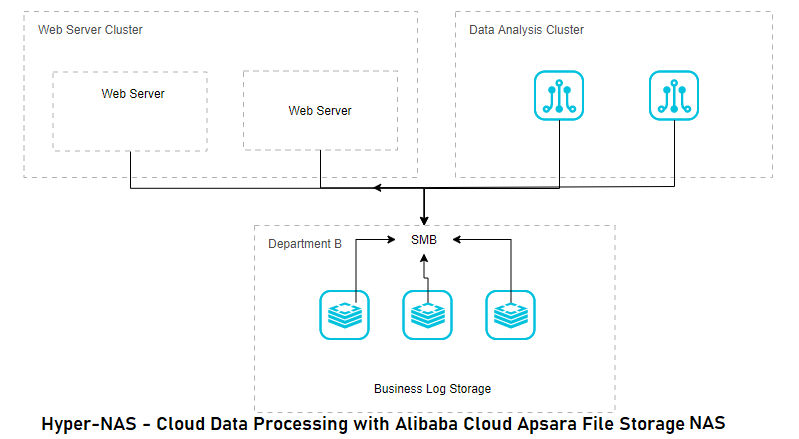
Alibaba Cloud File Storage NAS provides all the features that are required to run big data applications. NAS offers high throughput computing nodes, low latency, and data consistency at all stages. NAS supports the file semantics required by the applications to manage any analysis-based scenario. Data interactions also depend on the file system semantics, such as the file lock.
Business growth will multiply your data ten-folds. You will require a lot of storage for different types and sized files based on your deployment model. These could be images, audio files, videos, and other files that will require regular transmission (upload and download) using different channels, such as web or mobile apps.
The number of daily active users increased and exceeded one million with a possibility of expansion to over ten million over time. Any business requires disaster recovery across regions. Alibaba Cloud File Storage NAS provides disaster recovery measures to tackle and work through situations that could affect your business durability and availability. Alibaba Cloud NAS makes sure your applications and data are always available, and your business won’t suffer any losses.
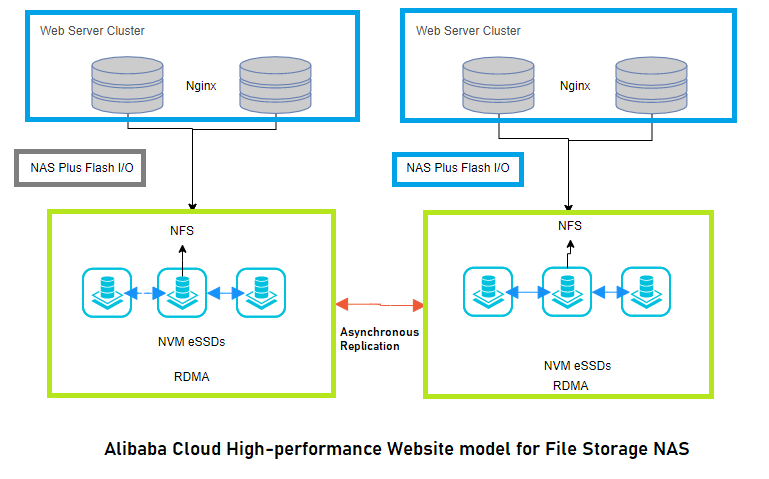
In the next article in this series on Alibaba Cloud File Storage NAS, we will continue discussing more use-case scenarios related to Alibaba Cloud File Storage NAS. We will also outline how NAS works with the Container Service for Kubernetes (ACK) and helps your DevOps pipeline.
Alibaba Cloud File Storage NAS – Part 1: Overview and Explanation
Alibaba Cloud File Storage NAS – Part: 3 More Use-Case Scenarios and DevOps

2,593 posts | 793 followers
FollowAlibaba Clouder - November 26, 2020
Alibaba Clouder - November 17, 2020
Alibaba Clouder - September 14, 2020
Yen Sheng - April 3, 2023
Alibaba Clouder - November 26, 2020
Alibaba Container Service - February 25, 2025

2,593 posts | 793 followers
Follow Cloud Migration Solution
Cloud Migration Solution
Secure and easy solutions for moving you workloads to the cloud
Learn More Backup and Archive Solution
Backup and Archive Solution
Alibaba Cloud provides products and services to help you properly plan and execute data backup, massive data archiving, and storage-level disaster recovery.
Learn More Data Lake Storage Solution
Data Lake Storage Solution
Build a Data Lake with Alibaba Cloud Object Storage Service (OSS) with 99.9999999999% (12 9s) availability, 99.995% SLA, and high scalability
Learn More Realtime Compute for Apache Flink
Realtime Compute for Apache Flink
Realtime Compute for Apache Flink offers a highly integrated platform for real-time data processing, which optimizes the computing of Apache Flink.
Learn MoreMore Posts by Alibaba Clouder